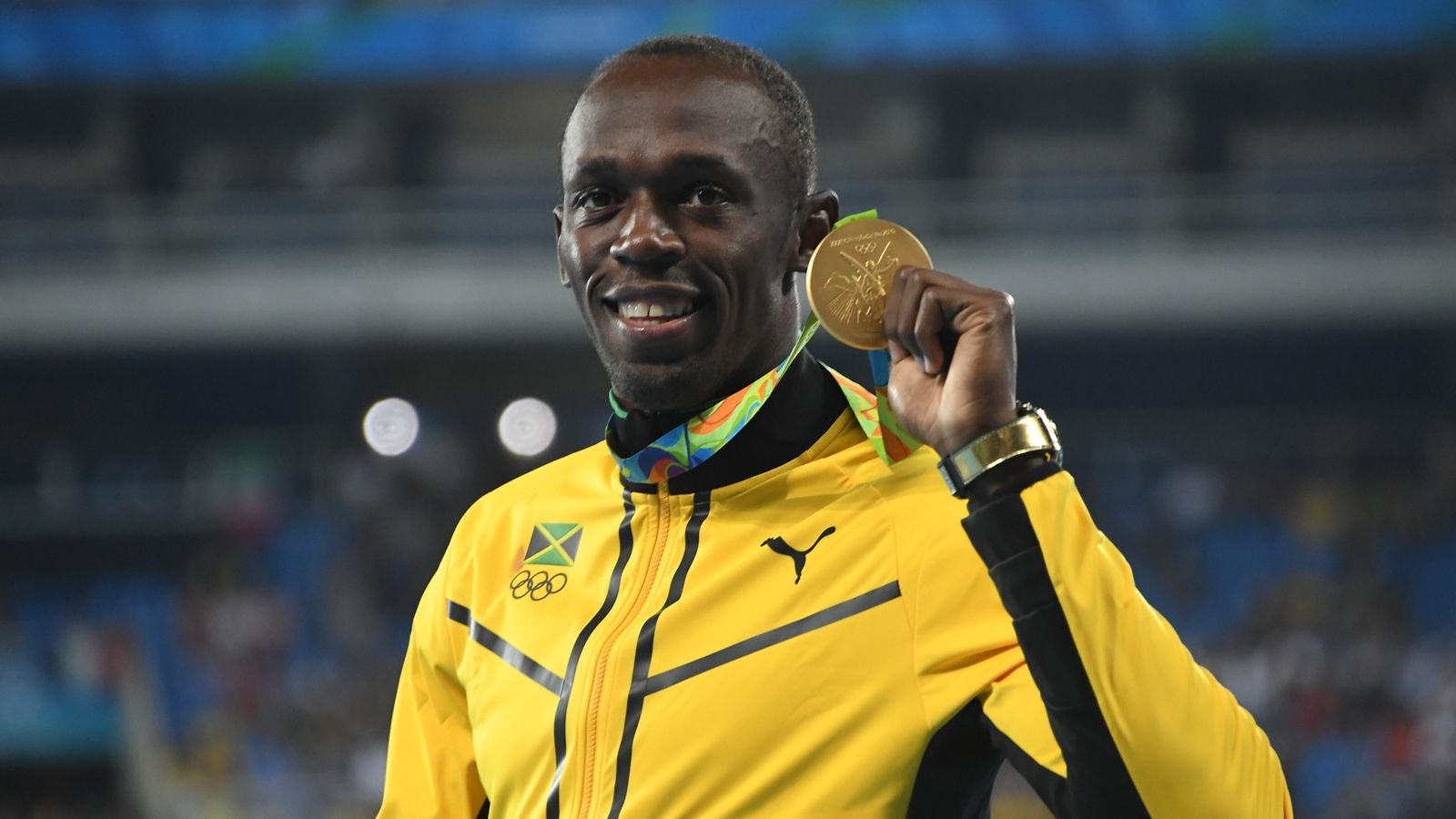Early Life and Introduction to Sprinting
Usain Bolt was born on August 21, 1986, in Sherwood Content, a small town in Trelawny, Jamaica. He was raised by his parents, Wellesley and Jennifer Bolt, along with his brother Sadiki and sister Sherine. From a young age, Bolt displayed a natural talent for running, often outpacing his peers in schoolyard races.
Bolt’s athletic abilities were first recognized by his cricket coach at Waldensia Primary School. Recognizing his sprinting potential, the coach encouraged Bolt to pursue track and field. At the age of 12, Bolt joined the local club, Racers Track Club, where he began formal training under the guidance of coaches like Pablo McNeil and Dwayne Barrett.
Growing up in the rural parish of Trelawny, Bolt’s childhood was heavily influenced by his family’s humble background. His father, a modest grocery store owner, and his mother, a hardworking farmer, instilled in him the values of discipline, determination, and humility – traits that would later shape his illustrious career.
Despite his natural speed, Bolt’s early years in athletics were not without challenges. He struggled with injuries and faced setbacks, but his unwavering dedication and love for the sport kept him motivated. As he progressed through the ranks, Bolt’s raw talent became increasingly evident, setting the stage for his meteoric rise to stardom.
Rise to Prominence
Bolt’s rise to prominence began in the early 2000s when he started competing at the highest levels of junior athletics. As a 15-year-old prodigy, he burst onto the scene by winning the 200m at the 2002 World Junior Championships in Kingston, Jamaica, with a world-record time of 20.61 seconds. This remarkable feat immediately put him in the spotlight and marked the beginning of his incredible journey.
In the following years, Bolt continued to dominate the junior circuit, setting several world records and winning numerous titles. His breakthrough performance on the senior stage came at the 2008 Jamaican Olympic Trials, where he set a new national record in the 200m with a time of 19.69 seconds, cementing his status as a serious contender for the upcoming Beijing Olympics.
At the 2008 Beijing Olympics, Bolt made history by winning three gold medals: the 100m, 200m, and 4x100m relay. His 100m victory in a world-record time of 9.69 seconds was particularly astonishing, as he accomplished this feat with a nonchalant stride and celebrated before even crossing the finish line. This iconic moment captured the world’s attention and solidified Bolt’s reputation as a once-in-a-generation sprinting phenomenon.
Olympic Glory
Usain Bolt’s Olympic exploits are the stuff of legends. He first burst onto the global stage at the 2008 Beijing Olympics, where he won three gold medals in spectacular fashion. In the 100m final, Bolt shattered his own world record, clocking an astonishing 9.69 seconds. He followed that up with a world record in the 200m (19.30 seconds) and anchored the Jamaican 4x100m relay team to another world record (37.10 seconds).
At the 2012 London Olympics, Bolt cemented his status as a living legend by defending all three of his Olympic titles. He won the 100m in an Olympic record time of 9.63 seconds, the 200m in 19.32 seconds, and the 4x100m relay in a world record time of 36.84 seconds. His dominance and showmanship captivated audiences worldwide.
The 2016 Rio Olympics witnessed Bolt’s swan song, but he went out in typical record-breaking fashion. He secured an unprecedented “triple-triple” by winning the 100m, 200m, and 4x100m relay for the third consecutive Olympics. His 100m victory in 9.81 seconds made him the first athlete to win three consecutive Olympic golds in the event. Bolt’s Olympic medal tally stands at an incredible eight gold medals, making him the most successful sprinter in Olympic history.
World Championships Domination
Usain Bolt’s reign at the World Championships was nothing short of extraordinary. From 2009 to 2015, he dominated the sprint events, cementing his status as the undisputed king of the track.
At the 2009 World Championships in Berlin, Bolt announced his arrival on the global stage with a stunning performance. He shattered his own world records in the 100m and 200m races, clocking 9.58 seconds and 19.19 seconds, respectively. His incredible speed and seemingly effortless stride left spectators in awe.
Two years later, at the 2011 World Championships in Daegu, South Korea, Bolt continued his dominance. He successfully defended his 200m title and led the Jamaican 4x100m relay team to victory, showcasing his versatility and team spirit.
The 2013 World Championships in Moscow witnessed another remarkable feat by Bolt. Despite facing a fierce challenge from Justin Gatlin, he prevailed in both the 100m and 200m events, reinforcing his status as the fastest man on the planet.
World Records
Usain Bolt’s name is synonymous with speed and world records in sprint events. Throughout his illustrious career, he has rewritten the record books multiple times, setting new benchmarks that seemed unimaginable just a few years ago.
One of Bolt’s most impressive feats is his world record in the 100m sprint, which he set at the 2009 World Championships in Berlin with a time of 9.58 seconds. This record has stood for over a decade, and many experts believe it could remain unbroken for years to come. Bolt’s incredible start, mind-boggling top speed, and sheer determination made this record possible.
In the 200m sprint, Bolt holds the world record of 19.19 seconds, set at the 2009 World Championships in Berlin. This record is even more remarkable considering the longer distance and the need to maintain top speed for a more extended period. Bolt’s ability to sustain his incredible pace over 200 meters is a testament to his exceptional conditioning and technique.
Training and Preparation
Usain Bolt’s incredible speed and dominance on the track were the result of years of dedicated training and meticulous preparation. His training regimen was carefully designed to maximize his natural abilities and push the boundaries of human performance.
Training Regimen: Bolt’s training routine was intense and focused on developing explosive power, speed, and endurance. He worked closely with his coach, Glen Mills, to create a customized program that included a combination of weight training, plyometrics, sprint drills, and track workouts. Bolt’s sessions were structured to gradually increase in intensity, allowing his body to adapt and recover properly.
Diet and Nutrition: Proper nutrition played a crucial role in Bolt’s training and recovery. His diet was carefully monitored and consisted of a high-protein, carbohydrate-rich meal plan designed to fuel his body and aid in muscle recovery. He also placed a strong emphasis on hydration, ensuring he remained properly hydrated throughout his grueling training sessions.
Coaching and Guidance: Bolt’s success was largely attributed to the guidance and expertise of his long-time coach, Glen Mills. Mills had a deep understanding of Bolt’s strengths and weaknesses and tailored his training programs accordingly. Their close relationship and mutual trust were key factors in Bolt’s ability to push himself to new heights.
Personality and Iconic Celebrations
Usain Bolt’s charismatic personality and iconic celebrations have made him a global icon transcending the world of athletics. With his lightning-bolt poses, beaming smiles, and infectious energy, Bolt has captivated audiences worldwide and left an indelible mark on popular culture.
From his early days, Bolt’s larger-than-life persona and infectious confidence set him apart. His bold statements and unwavering self-belief were backed by his incredible performances on the track. Bolt’s playful nature and ability to enjoy the moment endeared him to fans across the globe.
His iconic celebration, the “Lightning Bolt” pose, has become one of the most recognizable gestures in sports. With his arms outstretched and body leaned back, Bolt’s signature move has been imitated by countless fans, celebrities, and even world leaders. It has become a symbol of excellence, speed, and the sheer joy of achievement.
Rivalries and Controversies
Usain Bolt’s dominance in sprinting was not without its share of rivalries and controversies. One of his most notable rivalries was with fellow Jamaican sprinter Yohan Blake. The two trained together from a young age, and their friendly competition pushed each other to greater heights. However, their rivalry intensified when Blake defeated Bolt in the 100m and 200m events at the 2012 Jamaican Olympic Trials, casting doubt on Bolt’s invincibility.
At the 2012 London Olympics, Bolt and Blake faced off in the 100m and 200m finals, with Bolt emerging victorious in both events, reclaiming his title as the world’s fastest man. Their rivalry continued in subsequent years, with each pushing the other to break records and achieve new milestones.
Another significant rivalry was with American sprinter Justin Gatlin. Gatlin, who had previously served a doping ban, challenged Bolt’s dominance in the latter stages of his career. Their rivalry came to a head at the 2015 World Championships in Beijing, where Gatlin defeated Bolt in the 100m final, handing Bolt his first defeat in a major global championship.
Retirement and Legacy
Usain Bolt’s retirement from athletics was a bittersweet moment for fans and the sporting world alike. After dominating the sprinting events for over a decade, the Jamaican legend announced his plans to retire following the 2017 World Championships in London. His final individual race, the 100m final at the World Championships, ended in disappointment as he suffered a hamstring injury and had to be helped off the track.
However, Bolt’s legacy extends far beyond his final race. He is widely regarded as one of the greatest athletes of all time, having won an unprecedented eight Olympic gold medals and holding world records in the 100m and 200m events. His larger-than-life personality, electrifying performances, and iconic celebrations made him a global superstar and a true ambassador for the sport.
Endorsements and Business Ventures
Usain Bolt’s exceptional athletic prowess and larger-than-life personality have made him a highly sought-after figure for endorsements and business ventures. Throughout his illustrious career, he has secured lucrative deals with some of the world’s most prominent brands, capitalizing on his global fame and influence.
One of Bolt’s most significant endorsement partnerships has been with Puma, the German sportswear giant. Since signing with the brand in 2003, he has been a prominent face of their marketing campaigns, appearing in numerous advertisements and promotional events. The deal, reportedly worth over $10 million per year, has been a mutually beneficial arrangement, with Bolt’s electrifying performances on the track driving sales for Puma’s athletic apparel and footwear.
Future Endeavors and Plans
After retiring from professional athletics in 2017, Usain Bolt has expressed interest in pursuing various endeavors and plans for his post-sprinting career. While he has not committed to any specific long-term venture, Bolt has hinted at several potential paths he might explore.
One possibility is a foray into professional football (soccer). Bolt, a lifelong fan of the sport, has trained with several professional clubs, including Borussia Dortmund and the Norwegian side Strømsgodset. In 2018, he participated in a trial with the Australian club Central Coast Mariners, though he ultimately did not secure a contract. Despite this setback, Bolt has not ruled out the possibility of continuing to pursue a career in football.



